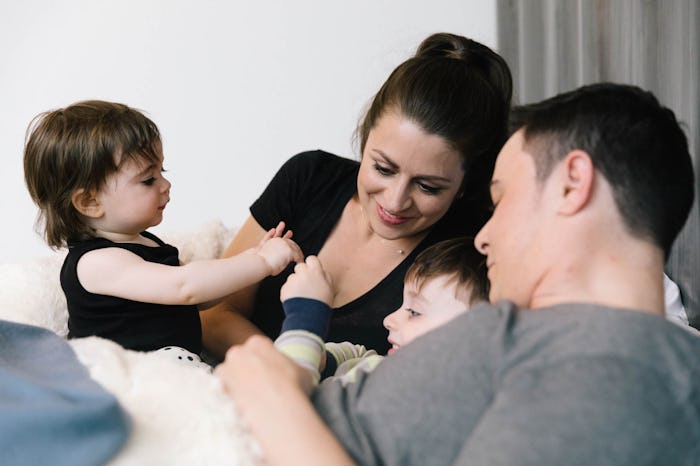Life
Your Child's Earliest Memory May Not Be What You Expect, & Here's Why
On the rare occasion that I actually sit still and simply enjoy watching my children play together, I feel myself filled to the brim thinking about the memories they're making right before my eyes. With the long summer days ahead of us, my two oldest kids will have countless experiences that they remember for the rest of their lives. But what about the baby and the toddler — will they remember these days together? What is the earliest memory children have?
Early Childhood Specialist Dr. Sally Goldberg says that all forms of learning are represented by synapses connecting in the brain, beginning in infancy and early childhood at a rapid-fire rate. The brain continues growing and connecting synapses over a lifetime, but the process slows drastically as we age. This explains why it's easier for a toddler to learn a second or third language than for an adult, but also why trauma has a deeper impact on a young child than on an adult.
"All experiences are processed and remembered on the level that they are experienced," Goldberg explains. "A baby remembers based on repetition, familiarity, and emotion, but their memory expertise gets more refined as they grow. After that, the brain keeps growing but slows in pace. Therefore, remembering gets clearer, more detailed, and specific over time."
Each person's earliest memory will naturally vary with their own life experiences and brain patterns, so there's no "one size fits all" to speak of. According to Psychology Today, anything from insignificant play to major injuries to family moves can become a child's first memory.
"What types of events persist into adult memory may well reflect characteristics of our childhood, as well representing what is integral to what matters to us," the magazine stated. "It is not yet clear why certain experiences are remembered for a lifetime, while so many more are not. The earliest childhood memories recalled by adults are often of emotional events. Although many such memories represent negatively emotional events, many also preserve the happy experiences of childhood."
While most people's earliest memory is something that happened around the age of 3 or 4, occasionally individuals might remember an experience that took place even earlier. My husband can remember climbing out of his crib when he was about a year old, and even describes details like peering through the slats as well as seeing the mobile hanging above him.
In all likelihood, most of us probably retained such memories at one point and eventually lost them along the way. According to Popular Science, there is a research-backed phenomenon known as "childhood amnesia," where children remember very early experiences for a time and ultimately lose them around age 7. Canadian researchers suggest that this is because of all the new cells grown in the hippocampus during infancy. The process is known as neurogenesis, and the explanation is simply that with all the new cell growth, our brains simply aren't storing memories that would otherwise be long-term ones.
Due to childhood amnesia, your 3-year-old might currently remember things that happened a year or two ago, only to lose the memory in elementary school. It's a bummer for parents, who want our kids to remember every special thing that we do, but it's a natural part of life, and happened to us at that age, too.
So what is your child's earliest memory? Ask them for some and see what they say. And if you're smart, you'll write down their answers for posterity, because the odds are good they won't remember the same ones 10 years from now.
